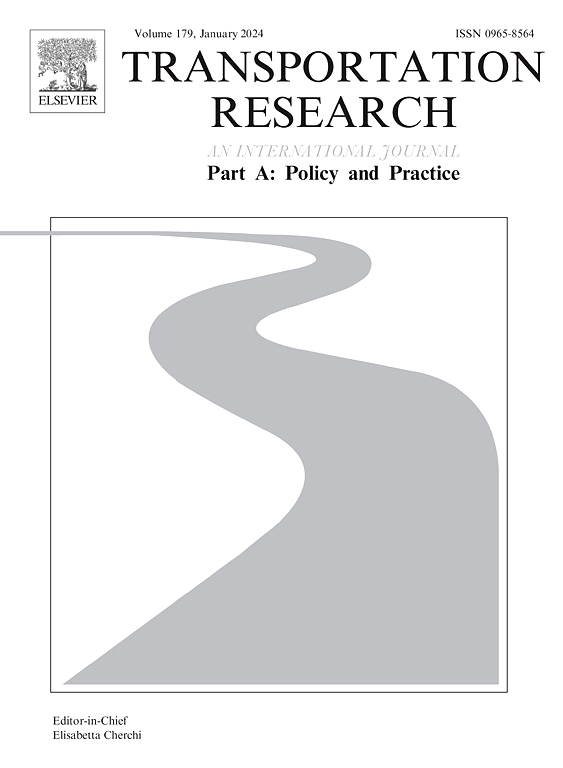Biking and belonging: understanding the role of socio-cultural influences on cycling in Auckland
IF 6.8
1区 工程技术
Q1 ECONOMICS
Transportation Research Part A-Policy and Practice
Pub Date : 2025-07-17
DOI:10.1016/j.tra.2025.104599
引用次数: 0
Abstract
This research investigates the influence of socio-cultural factors and sociodemographic characteristics on bicycle use in Auckland, a multi-cultural city in New Zealand. To identify the strength of socio-cultural factors compared to other various social psychological determinants, a conceptual model is proposed encompassing Socio-cultural influences, Price Value, Perceived Safety and Security, Perceived accessibility, Information and Engagement, and Bicycle use. Using Structural Equation Modelling (SEM), the effects of these determinants on bicycle use were assessed. The moderating effects of sociodemographic factors including age, gender, ethnicity, and income level on the influence of these determinants on bicycle usage were also examined. Results suggest that socio-cultural influences have the strongest impact on bicycle use in Auckland, showing that those who ride a bicycle more than others are influenced more by family, friends, community, and culture to use a bicycle. Additionally, sociodemographic characteristics only moderate the influence of socio-cultural factors on bicycle usage indicating that socio-cultural factors influence bicycle use differently across various population groups. The strong influence of socio-cultural factors and the moderating role of sociodemographic characteristics on bicycle use in Auckland suggest that social and cultural dynamics are critical in shaping individual decisions to cycle, even more than practical considerations such as price, infrastructure, engagement, or safety. Therefore, transport strategies targeting specific population groups and relevant socio-cultural barriers can enhance bicycle use and promote equity in cycling. Suggested transport strategies include integrating socio-cultural initiatives with local government’s transport policies such as education, community engagement, and awareness campaigns, implementing effective monitoring and evaluation initiatives followed by longitudinal investigations, and incorporating cultural representation in cycling initiatives. These short-term, mid-term, and long-term strategies can guide the development of more inclusive and effective transport strategies to enhance cycling participation across diverse demographic groups and achieve broader societal benefits.
骑自行车和归属感:了解奥克兰社会文化对骑自行车的影响
本研究调查了新西兰多元文化城市奥克兰的社会文化因素和社会人口特征对自行车使用的影响。为了确定社会文化因素与其他各种社会心理决定因素相比的强度,提出了一个包含社会文化影响、价格价值、感知安全与保障、感知可及性、信息与参与以及自行车使用的概念模型。利用结构方程模型(SEM),评估了这些决定因素对自行车使用的影响。研究还考察了年龄、性别、种族和收入水平等社会人口因素对这些决定因素对自行车使用的影响的调节作用。结果表明,社会文化影响对奥克兰自行车使用的影响最大,表明那些骑自行车的人比其他人更容易受到家庭、朋友、社区和文化的影响。此外,社会人口特征仅调节社会文化因素对自行车使用的影响,表明社会文化因素对不同人口群体自行车使用的影响不同。社会文化因素的强烈影响和社会人口特征对奥克兰自行车使用的调节作用表明,社会和文化动态在塑造个人骑行决定方面至关重要,甚至比实际考虑因素(如价格、基础设施、参与度或安全性)更重要。因此,针对特定人群和相关社会文化障碍的交通策略可以提高自行车的使用,促进骑行的公平性。建议的交通策略包括将社会文化举措与当地政府的交通政策(如教育、社区参与和意识运动)结合起来,在纵向调查之后实施有效的监测和评估举措,并将文化代表性纳入自行车计划。这些短期、中期和长期战略可以指导制定更具包容性和更有效的交通战略,以提高不同人口群体的骑行参与度,并实现更广泛的社会效益。
本文章由计算机程序翻译,如有差异,请以英文原文为准。
求助全文
约1分钟内获得全文
求助全文
来源期刊
CiteScore
13.20
自引率
7.80%
发文量
257
审稿时长
9.8 months
期刊介绍:
Transportation Research: Part A contains papers of general interest in all passenger and freight transportation modes: policy analysis, formulation and evaluation; planning; interaction with the political, socioeconomic and physical environment; design, management and evaluation of transportation systems. Topics are approached from any discipline or perspective: economics, engineering, sociology, psychology, etc. Case studies, survey and expository papers are included, as are articles which contribute to unification of the field, or to an understanding of the comparative aspects of different systems. Papers which assess the scope for technological innovation within a social or political framework are also published. The journal is international, and places equal emphasis on the problems of industrialized and non-industrialized regions.
Part A''s aims and scope are complementary to Transportation Research Part B: Methodological, Part C: Emerging Technologies and Part D: Transport and Environment. Part E: Logistics and Transportation Review. Part F: Traffic Psychology and Behaviour. The complete set forms the most cohesive and comprehensive reference of current research in transportation science.

 求助内容:
求助内容: 应助结果提醒方式:
应助结果提醒方式:


